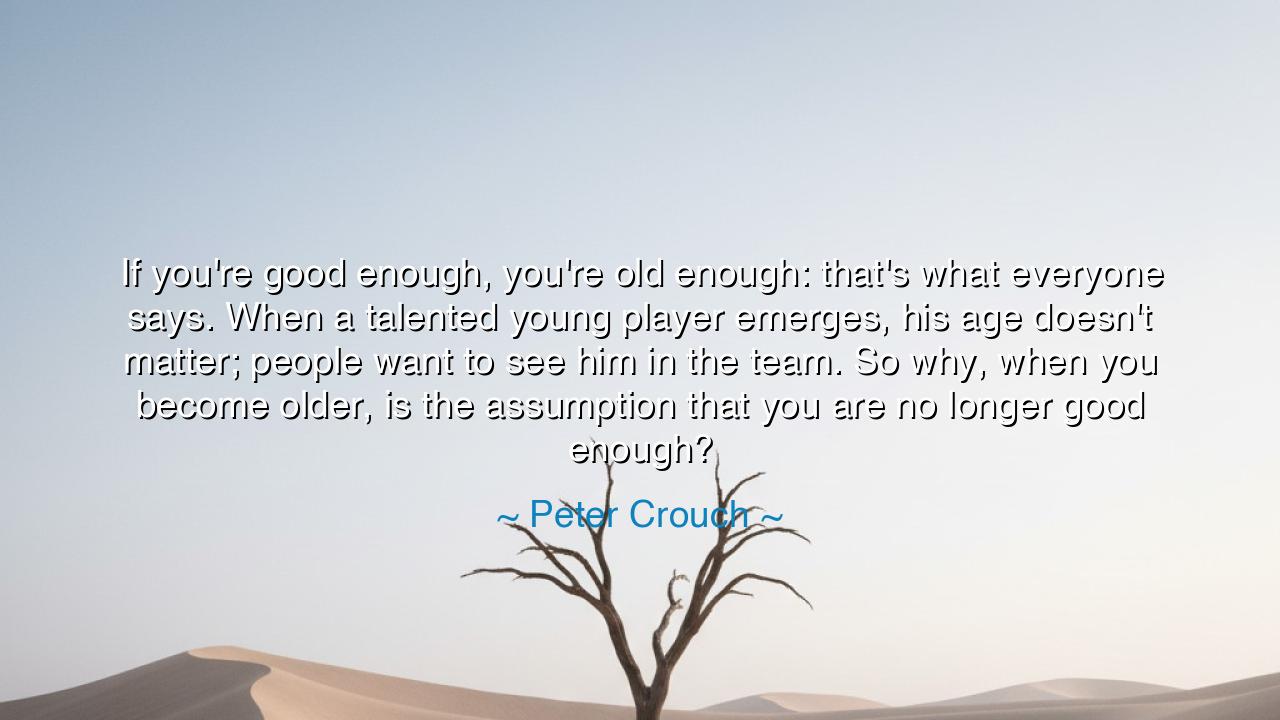
If you're good enough, you're old enough: that's what everyone
If you're good enough, you're old enough: that's what everyone says. When a talented young player emerges, his age doesn't matter; people want to see him in the team. So why, when you become older, is the assumption that you are no longer good enough?






In the unfolding narrative of a person’s life, there is often a profound tension between youth and age—a tension that seems to govern not only how we are perceived, but how we are allowed to exist and succeed in the world. Peter Crouch, a man who has spent much of his life in the world of professional football, offers a stirring reflection on this very theme: “If you're good enough, you're old enough: that's what everyone says. When a talented young player emerges, his age doesn't matter; people want to see him in the team. So why, when you become older, is the assumption that you are no longer good enough?” These words, full of frustration and wisdom, speak to the double standard that exists in many areas of life—the notion that youth is synonymous with potential, while age is often assumed to signify decline.
What, then, does it mean when Crouch challenges the assumption that age should determine ability? It calls attention to a deeper truth: that age alone should never be the measure of worthiness or talent. When a young player, brimming with promise, steps onto the field, their age is rarely questioned. Youth is seen as a vessel of possibility—unformed, untapped, ready to blossom into something great. But as time passes and that player grows older, the narrative often shifts. Suddenly, age becomes a barrier, a reason to question one’s ability—as if the accumulation of experience and wisdom through the years somehow negates the very qualities that made the individual great in the first place. The assumption that one’s worth diminishes with age is a falsehood that diminishes the value of experience, perseverance, and continuous growth.
This conflict between youth and age is not a new phenomenon. In the ancient world, the Greeks celebrated both the strength of the young and the wisdom of the aged. The great philosopher Socrates, for instance, was not considered a great teacher because of his youthful vigor but because of his ability to ask questions, to draw out wisdom, and to reflect deeply on the world. His contributions were shaped not by his physical strength but by his mind, which only deepened with age. In contrast, Achilles, the legendary hero of the Iliad, represented the unbridled power and glory of youth, yet he was doomed to a brief life, cut short in the prime of his strength. Both figures, though vastly different in their ways, showed that both youth and age have their roles in the world, and neither should be dismissed as inherently better than the other.
Even in the realm of sport, history offers us examples of athletes who defied the conventional wisdom about age and ability. Consider the case of George Blanda, a quarterback and placekicker in the NFL, who played professionally until the age of 48. At a time when most athletes are well into retirement, Blanda continued to perform at a high level, defying the stereotype that age inevitably leads to decline. His longevity in a physically demanding sport was not merely a product of youthful exuberance but of a deep commitment, adaptation, and mastery of his craft. Like Crouch, Blanda’s story challenges the idea that age should determine one's value or potential.
This cultural assumption that age somehow reduces one's worth is a deep-seated bias that runs through many aspects of life. The ancient Romans, for example, had a deep respect for elders, whose experience and counsel were seen as vital to the health of the state. Yet, even in their society, there were contradictions. While the elders were revered for their wisdom, the younger generations often sought to replace them in positions of power, assuming that youth brought with it the vigor and strength needed to lead. This struggle between the older generation’s wisdom and the younger generation’s energy remains a timeless tension, one that Crouch’s words force us to confront once again.
The lesson, then, is one of balance and understanding. Just as Crouch challenges the presumption that age means decline, we must all remember that age is not a measure of ability but of experience. Youth brings new ideas, but age brings the wisdom to refine and implement those ideas. It is not in the age of the individual that we should place our judgment but in the quality of their work—whether that work is a football match, a philosophical dialogue, or the pursuit of any craft or skill. Let us not dismiss those who have aged as irrelevant but instead embrace the strength that comes from growth, from the continued pursuit of mastery, and from the wisdom earned through time.
Thus, the lesson for each of us is to resist the temptation to define ourselves—or others—by the number of years lived. Let us instead focus on the quality of our efforts, the depth of our insight, and the strength of our resolve, regardless of our age. Just as Crouch urges us to see the value of the older player, we must also acknowledge that in all things, age should be seen not as a limitation, but as a well of experience that, when coupled with youthful vigor, can achieve great things. Let us, then, honor both the youthful spirit and the aged wisdom, knowing that true value lies not in the number of years we’ve lived, but in how fully we’ve embraced the journey of life.






AAdministratorAdministrator
Welcome, honored guests. Please leave a comment, we will respond soon